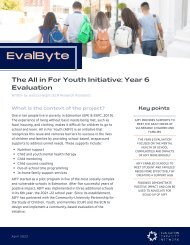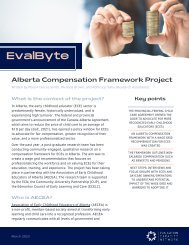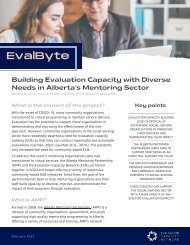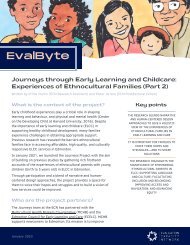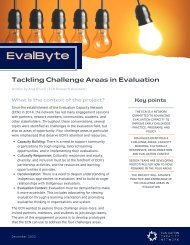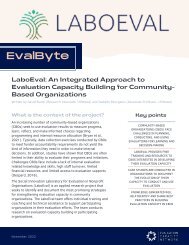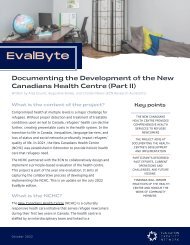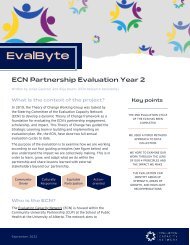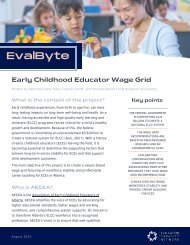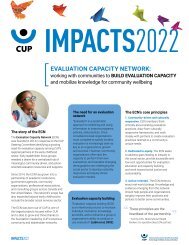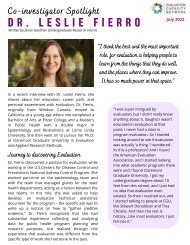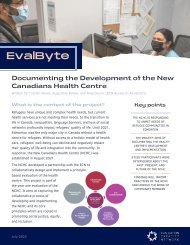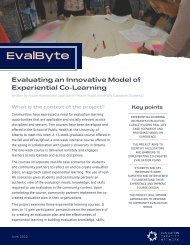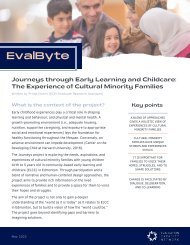ECN: Year 2 Evaluation Report
You also want an ePaper? Increase the reach of your titles
YUMPU automatically turns print PDFs into web optimized ePapers that Google loves.
Evaluating Ourselves: What We Learned<br />
A Summary of Findings from the Second <strong>Year</strong> of our Partnership <strong>Evaluation</strong><br />
(September 1, 2021 to August 31, 2022)<br />
In 2019, the Theory of Change Working Group was tasked by the Steering Committee to develop a dynamic Theory of Change<br />
framework (abbreviated illustration on the next page) as a foundation for evaluating the <strong>ECN</strong>'s partnership engagement,<br />
scholarship, and impact. This Theory of Change has guided the Strategic Learning Team in building and implementing an<br />
evaluation plan. This report is a summary of evaluation findings from <strong>Year</strong> 2 of this evaluation.<br />
Authors:<br />
Jenae Gauthier, Anja Dzunic, Rich Janzen, Pieter de Vos, Pauline MacPherson<br />
<br />
<br />
We would also like to acknowledge the individuals who were involved in the implementation of the evaluation:<br />
Shelly Jun, and Hannah Bowley<br />
<br />
<br />
<strong>ECN</strong> Partnership <strong>Evaluation</strong> <strong>Report</strong> 2021 | 1
Early Childhood Practices, Programs, and Policies<br />
A Partnership<br />
Theory of Change<br />
Taking part in<br />
our projects<br />
leads to...<br />
ENGAGEMENT<br />
KNOWLEDGE &<br />
SKILLS CREATED<br />
ACTION &<br />
IMPACT<br />
LEGEND<br />
Research<br />
Questions<br />
How will we<br />
get there?<br />
GUIDING<br />
PRINCIPLES<br />
1. Community Driven<br />
2. Culturally Responsive<br />
3. Equitable Participation<br />
4. Action-oriented<br />
OUR GOAL<br />
To develop community-driven and<br />
culturally responsive approaches for<br />
producing and using evidence to improve<br />
early childhood practice, programs, and<br />
policy towards system effectiveness.<br />
OUR OBJECTIVES<br />
<br />
Objective #1<br />
Deepen understanding<br />
through engagement<br />
and collaboration to<br />
ensure that evaluations<br />
are community- driven<br />
and culturally<br />
responsive.<br />
How do we ensure that the demand<br />
for, creation, and use of evidence are<br />
community-driven and culturally<br />
responsive?<br />
Greater capacity<br />
in ensuring that<br />
research<br />
collaboration is<br />
communitydriven<br />
Objective #2<br />
Co-create and<br />
implement research<br />
and evaluation that<br />
is mutually<br />
beneficial to all <strong>ECN</strong><br />
partners.<br />
Building authentic<br />
partnerships and<br />
collaborations<br />
Greater capacity<br />
in ensuring<br />
equitable<br />
participation of<br />
stakeholders in<br />
research<br />
collaboration<br />
<br />
Objective #3<br />
Develop an <strong>Evaluation</strong> Hub<br />
that connects people to<br />
evaluation resources, learning,<br />
and support to mobilizes<br />
knowledge and build<br />
evaluation capacity in the early<br />
childhood field.<br />
How do we increase knowledge,<br />
skills, and motivation to create<br />
& use meaningful evidence<br />
through innovative capacity<br />
building approaches?<br />
Training and<br />
mentoring<br />
Greater<br />
capacity for<br />
ongoing colearning<br />
Greater<br />
capacity in<br />
using evidence<br />
Research and<br />
evaluation<br />
projects<br />
Greater<br />
capacity in<br />
creating<br />
quality/useful<br />
evidence<br />
Partners<br />
<strong>ECN</strong><br />
<br />
Increased access to and use of<br />
evaluation resources<br />
<br />
Lasting connections<br />
<br />
Deepened community of practice<br />
<br />
How do we increase the value<br />
and use of evidence for decision<br />
making to improve practice,<br />
programs, and policy?<br />
Greater<br />
mobilization of<br />
people<br />
<strong>Evaluation</strong> Field<br />
<br />
Increased<br />
understanding of<br />
community-driven<br />
and culturally<br />
responsive evaluation<br />
<br />
<br />
<br />
Knowledge<br />
mobilization<br />
Greater<br />
mobilization of<br />
evidence<br />
Greater value<br />
and use of<br />
evidence in<br />
decision-making<br />
across<br />
stakeholders<br />
Early <strong>Year</strong>s Sector<br />
Increased culture of<br />
learning and use of<br />
evidence<br />
Improved outcomes<br />
in early childhood<br />
Activities<br />
Outcomes<br />
ULTIMATE<br />
OUTCOMES<br />
More innovative early<br />
childhood practices,<br />
programs, and<br />
policies<br />
<br />
Greater system<br />
effectiveness in<br />
improving early<br />
childhood outcomes
PARTNERSHIP EVALUATION: YEAR2<br />
1<br />
2<br />
3<br />
<br />
4<br />
<br />
Purpose<br />
The purpose of this evaluation is to:<br />
Examine how we are working according to our<br />
four guiding principles (community-driven, culturally<br />
responsive, equitable participation, action-oriented).<br />
Understand the impact we are collectively making.<br />
<br />
This is in order to learn, grow, and adapt what we do (within the<br />
partnership) and share lessons learned with external<br />
stakeholders (beyond our partnership).<br />
<strong>Evaluation</strong> Questions<br />
To what extent are our partnership’s activities (engaging<br />
communities, co-creating/co-learning, and EvalHub<br />
capacity building) aligned to our four guiding principles<br />
(community-driven, culturally responsive, equitable<br />
participation, action-oriented)?<br />
<br />
How, and to what extent, are we effectively building<br />
capacity both internally as we equip ourselves to do our<br />
work, and externally as we mobilize what we are learning<br />
with others?<br />
<br />
How, and to what extent, is our partnership’s work<br />
reaching our ultimate goal to improve early childhood<br />
practice, programs, and policy towards system<br />
effectiveness? How are our collective efforts contributing<br />
to the development of children in Canada?<br />
<br />
What can we do to improve the effectiveness of our<br />
partnership in meeting our desired outcomes? What are<br />
we learning about how to carry out such a partnership?<br />
<br />
<br />
<br />
Data Sources<br />
The majority of data came<br />
from this method!<br />
Student Community of Practice Focus Groups<br />
4 focus groups with 5-9 participants<br />
5 open-ended questions discussed during monthly student CoP meetings<br />
Data collection: January 2022 - July 2022 <br />
<br />
Meeting Minutes<br />
Reviewed meeting minutes from all <strong>ECN</strong> working groups and committees to<br />
triangulate themes<br />
Data collection: September 2021 - August 2022<br />
CUP/<strong>ECN</strong> Student Survey<br />
Students responded to the survey before joining the <strong>ECN</strong> and at follow up<br />
several months later<br />
Data collection: September 2021 - August 2022 (n = 8 responses)<br />
Post-Meeting Surveys<br />
Responses were submitted online after Knowledge Exchange Working Group<br />
and Steering Committee meetings<br />
Data collection: September 2021 -<br />
<br />
August 2022 (n = 16 responses)<br />
Activity Tracking<br />
<strong>ECN</strong> activities and outputs were tracked<br />
Data collection: April 2019 - August 2022<br />
Role and work sector of postmeeting<br />
survey participants<br />
Researcher (40.91%) Leader/Manager (13.64%)<br />
Funder (4.55%) Evaluator (13.64%)<br />
Student (18.18%) Intern (4.55%)<br />
Community Member (4.55%)<br />
<strong>ECN</strong> Partnership <strong>Evaluation</strong> <strong>Report</strong> 2021 | 3
<strong>Evaluation</strong> question 1: To what extent are our partnership's activities (engaging communities, co-creating/co-learning, and EvalHub capacity<br />
building) aligned to our four guiding principles (community-driven, culturally responsive, equitable participation, action-oriented)?<br />
Students expressed that there is lack of clarity in the definitions of the four guiding principles. They perceived the values as<br />
contextual, i.e. the values will mean different things in different settings and projects. Students in particular didn't know how to<br />
measure these values and thus felt it is difficult to gauge to what extent the <strong>ECN</strong> is living them out. Nonetheless, partners and<br />
students identified some aspects of the <strong>ECN</strong> that align with the principles.<br />
Community-driven<br />
Our partnerships activities and<br />
projects are considered to be<br />
community-driven to different<br />
extents, depending on the<br />
project at hand. The <strong>ECN</strong> is<br />
doing well in seeking<br />
engagement with<br />
communities, through for<br />
example surveys and<br />
engagement sessions, to<br />
understand their needs, assets<br />
and inform decision making.<br />
I'm seeing these values as<br />
more of like a mixing board.<br />
Because we can't really have<br />
100% of any of them because<br />
of capacity, but I think they<br />
keep us grounded.<br />
Culturally<br />
Responsive<br />
Efforts to be more culturally<br />
responsive have been made<br />
within the network over the<br />
past year, primarily by<br />
incorporating it into capacity<br />
building initiatives.<br />
Indigenous<br />
component<br />
in UEval<br />
CR<br />
Workshop<br />
representative<br />
samples<br />
teaching<br />
CR-E in<br />
lectures<br />
However, some students<br />
commented that key<br />
stakeholders they are working<br />
with are not always culturally<br />
diverse, despite the fact that<br />
front line workers represent a<br />
variety of cultures.<br />
Equitable<br />
Participation<br />
Internally, the <strong>ECN</strong> runs in an<br />
equitable manner. A diversity<br />
of perspectives is represented<br />
in the partnership.<br />
Externally, the <strong>ECN</strong> is seeking<br />
engagement with a variety of<br />
people and sectors to inform<br />
forthcoming activities.<br />
Partners and students also<br />
perceived the <strong>ECN</strong>'s capacity<br />
building initiatives as lowbarrier<br />
as<br />
they are accessible<br />
nationwide<br />
tuition subsidies are<br />
available<br />
Action-Oriented<br />
Some partners felt that<br />
meetings are well organized,<br />
while others felt they should<br />
have clearer outcomes and be<br />
more focused.<br />
Students seemed to define<br />
action-oriented as seeing<br />
results or an impact from the<br />
work they are doing. This was<br />
difficult to measure for them.<br />
Students expressed higher<br />
confidence of their projects<br />
being action-oriented when<br />
projects had high levels of<br />
community engagement.<br />
How is this gonna actually<br />
translate into action on the<br />
ground for practitioners?<br />
<strong>ECN</strong> Partnership <strong>Evaluation</strong> <strong>Report</strong> 2022 | 4
<strong>Evaluation</strong> question 2: How and to what extent are we effectively building capacity both internally as we equip ourselves to do our work,<br />
and externally as we mobilize what we are learning with others?<br />
Internally<br />
Students identified many ways during the focus groups through which they are building their own capacity.<br />
These are the skills students mentioned to have gained most often:<br />
<strong>Evaluation</strong> and research knowledge and skills, such as<br />
soft skills, i.e. communication, leadership, being more<br />
reflective, collaboration and networking<br />
hard skills, i.e. data analysis skills, academic writing,<br />
literature review, knowledge mobilization and translation<br />
Understanding of community-based collaboration, including<br />
the value of community-driven work and working<br />
collaboratively with stakeholders<br />
the fluidity and iterative nature of community-based work<br />
being proactive and anticipating concerns<br />
building relationships and reaching out for help<br />
Group facilitation and public speaking skills, including<br />
running focus groups<br />
<br />
mentoring students<br />
facilitating meetings<br />
planning what questions to ask and how to ask them<br />
developing presentations<br />
better prepare them for future<br />
employment, continuing<br />
education, and<br />
<br />
thesis work<br />
help them navigate<br />
different contexts<br />
and community<br />
partners<br />
Students explained how these<br />
skills will:<br />
help them do<br />
community-based<br />
participatory<br />
research and<br />
evaluation<br />
teach them<br />
independence in<br />
work responsibilities<br />
Students in particular mentioned that UEval/QEval<br />
was helpful in developing their confidence in<br />
facilitation skills, as well as navigating group dynamics.<br />
Some students were confident that the skills will be used<br />
somewhere but they were unsure how exactly or where they<br />
will be able to apply them.<br />
<strong>ECN</strong> Partnership <strong>Evaluation</strong> <strong>Report</strong> 2022 | 5
<strong>Evaluation</strong> question 2: How and to what extent are we effectively building capacity both internally as we equip ourselves to do our work,<br />
and externally as we mobilize what we are learning with others?<br />
In the CUP/<strong>ECN</strong> student survey, students (n = 8) reported to<br />
have improved in many research and evaluation skills. Results show<br />
statistically significant improvement in the following six skills:<br />
it's overwhelming<br />
sometimes to just be soaking in so<br />
much information and practicing a<br />
lot of new skills in some areas. But<br />
it's really, really rewarding at the<br />
same time.<br />
There were some areas where students have not improved<br />
their skills, including: teaching, EDI, and creating<br />
project/community reports. Students' were also asked to rate<br />
their knowledge and confidence in various research and<br />
evaluation areas. Findings showed an increase in student's<br />
knowledge and confidence as a result of their experience with<br />
the <strong>ECN</strong>.<br />
*<br />
*<br />
*<br />
**<br />
***<br />
Note: Students rated their skills/competence on a 5-point likert scale - novice (0) to advanced (5). The chart<br />
shows the mean of all responses with a statistically significant change from pre-survey to follow-up.<br />
*p = .049; **p = .011; ***p = .033<br />
Capacity Building is a<br />
process, not an outcome.<br />
Through the work with the <strong>ECN</strong>, students’ attitude,<br />
perception, and understanding of capacity building<br />
has changed.<br />
Even just experiencing<br />
those, like different group<br />
dynamics, is really helpful in<br />
terms of future work,<br />
right? Because it's not like<br />
I'm going to be working<br />
independently forever. A lot<br />
of like research and<br />
evaluation involves<br />
collaborative<br />
group work.<br />
<strong>ECN</strong> Partnership <strong>Evaluation</strong> <strong>Report</strong> 2022 | 6
<strong>Evaluation</strong> question 2: How and to what extent are we effectively building capacity both internally as we equip ourselves to do our work,<br />
and externally as we mobilize what we are learning with others?<br />
Externally<br />
Partners and students also described how the <strong>ECN</strong> is building capacity externally, for example in communities. Activity<br />
Tracking allowed us to identify the activities we are engaging in to build capacity in communities. For a full list of<br />
partnership activities, go to page 4-5 and 9-10 of the partnership report.<br />
292<br />
Course<br />
learners<br />
3<br />
experiential<br />
living labs<br />
75<br />
community<br />
organizations<br />
supported in<br />
creating evaluation<br />
plans<br />
305<br />
resources in<br />
the <strong>ECN</strong>'s<br />
Repository<br />
Experiential<br />
learning courses at<br />
4<br />
partner<br />
Universities<br />
building capacity of communities and<br />
meeting their needs through courses<br />
The <strong>ECN</strong> is...<br />
Recent projects include:<br />
<br />
Language revitalization<br />
in Indigenous<br />
communities<br />
Early learning and<br />
childcare for newcomer<br />
families<br />
Supportive housing<br />
models for teen<br />
families<br />
Building capacity for<br />
Canadian child and<br />
youth mentoring<br />
organizations<br />
mobilizing and facilitating<br />
access to evaluation resources<br />
involved in and supports<br />
numerous evaluation projects<br />
<strong>ECN</strong> Partnership <strong>Evaluation</strong> <strong>Report</strong> 2022 | 7
<strong>Evaluation</strong> question 3: How and to what extent is our partnership's work reaching our ultimate goal to improve early childhood practice,<br />
programs, and policy towards system effectiveness? How are our collective efforts contributing to the development of children in Canada?<br />
Students identified how their projects are contributing to<br />
our partnership objectives.<br />
Partners and students expressed how the <strong>ECN</strong> is:<br />
Research Projects<br />
with MRU<br />
Experiental Learning<br />
<strong>Evaluation</strong><br />
Objective 1<br />
Deepen understanding through<br />
engagement and collaboration to<br />
ensure that evaluations are<br />
community- driven and<br />
culturally responsive.<br />
Lunch and Learns<br />
Knowledge Exchange<br />
Working Group<br />
Increasing capacity<br />
in the ECD sector<br />
through research and<br />
evaluation projects,<br />
but the extent of it is<br />
unknown.<br />
Creating<br />
collaboration<br />
opportunities to<br />
inform decisionmaking.<br />
AVIRT<br />
Objective 2<br />
Co-create and<br />
implement research<br />
and evaluation that is<br />
mutually beneficial to<br />
all <strong>ECN</strong> partners.<br />
All In For Youth<br />
UEval/QEval<br />
Alberta Mentoring<br />
Partnership<br />
CD-E Scoping Review<br />
Objective 3<br />
Develop an <strong>Evaluation</strong> Hub that<br />
connects people to evaluation<br />
resources, learning, and support<br />
to mobilizes knowledge and<br />
build evaluation capacity in the<br />
early childhood field.<br />
Note: This is not a complete list of projects the <strong>ECN</strong> is supporting, but includes only those that were<br />
reflected upon in student focus groups.<br />
Mobilizing resources<br />
and evidence<br />
through the <strong>ECN</strong><br />
repository,<br />
<br />
webinars and other<br />
methods.<br />
While<br />
the repository is a<br />
good resource,<br />
it should be made<br />
more user<br />
friendly.<br />
Looking back at our Theory of Change, we are meeting several<br />
of our outcomes, but as expected have not yet reached our ultimate<br />
outcome of creating more innovative ECD practices, programs, and<br />
policies towards greater system effectiveness.<br />
<strong>ECN</strong> Partnership <strong>Evaluation</strong> <strong>Report</strong> 2022 | 8
<strong>Evaluation</strong> question 4: What can we do to improve the effectiveness of our partnership in meeting our desired outcomes? What are we<br />
learning about how to carry out such a partnership?<br />
How to improve...<br />
The Student Experience<br />
How to improve...<br />
Meetings<br />
In student focus groups and the student survey, students identified three<br />
key areas of improvement:<br />
1) Orientation and Understanding the <strong>ECN</strong><br />
Newer students received an orientation to the <strong>ECN</strong> and<br />
perceived it as helpful<br />
Booklet of <strong>ECN</strong> acronyms may be needed<br />
Assigning a student mentor to incoming students<br />
Students wish to understand better how they fit into the<br />
bigger <strong>ECN</strong> partnership<br />
2) Internal Relationships and Communication<br />
Students wanted to have time to ask questions to<br />
leadership, regular team meetings (<strong>ECN</strong> started bi-weekly<br />
team meetings recently), and supervisor check ins<br />
<strong>ECN</strong> team text group chat and someone who moderates it<br />
'Buddying' up on projects<br />
Creating deeper connections with co-workers<br />
Continuing CoP as a safe place for students to check in<br />
<br />
3) Projects and Skills<br />
Providing opportunities to work on various<br />
tasks/projects and gain a range of new skills<br />
Following up with students to ensure their needs<br />
and interests are met<br />
<br />
I had a whole<br />
week kind of just to<br />
focus on getting to know<br />
what <strong>ECN</strong> is doing. So that<br />
was, yes, it was a lot of<br />
information. But it was<br />
helpful to kind of get my<br />
foot into it easy and<br />
at least start understanding<br />
what it's about and<br />
what projects<br />
it has.<br />
I think some deeper<br />
connection would be<br />
really nice to see<br />
because I think that<br />
would also really<br />
expand our capacity to<br />
support each other in<br />
the more evaluationbased<br />
life that we're<br />
living with <strong>ECN</strong> as<br />
well.<br />
Following suggestions were given<br />
by meeting participants to<br />
improve meetings:<br />
<br />
<br />
Use collaborative platforms<br />
to increase engagement<br />
Increase meeting efficiency<br />
(e.g., shorter meetings, send<br />
out documents to review<br />
beforehand, establish clear<br />
outcomes)<br />
Encourage everyone in the<br />
meeting to contribute to<br />
discussions<br />
How can we get more<br />
people to contribute to this<br />
discussion?<br />
<strong>ECN</strong> Partnership <strong>Evaluation</strong> <strong>Report</strong> 2022 | 9
<strong>Evaluation</strong> question 4: What can we do to improve the effectiveness of our partnership in meeting our desired outcomes? What are we<br />
learning about how to carry out such a partnership?<br />
How to improve...<br />
The Wider Network<br />
Suggestions were also provided by partners and students on how to improve the partnership in general.<br />
More<br />
Intentionality<br />
is needed in<br />
targeting the desired audience<br />
leveraging partners to grow the network<br />
building communities of practice<br />
reaching out to other sectors<br />
<strong>ECN</strong>'s<br />
ECB Initiatives<br />
need to<br />
be tailored to the needs and resources of specific community organizations<br />
provide support for implementing evaluations<br />
incorporate an EDI lens<br />
The <strong>ECN</strong><br />
could<br />
improve<br />
Communication<br />
& Enagement<br />
by<br />
using diverse Knowledge Mobilization techniques<br />
using audience-appropriate language and promoting a learning lens to evaluation<br />
increasing awareness of the <strong>ECN</strong><br />
improving information exchange between our partners<br />
seeking new perspectives<br />
building relationships with Indigenous evaluators<br />
<br />
<strong>ECN</strong> Partnership <strong>Evaluation</strong> <strong>Report</strong> 2022 | 10
Conclusion<br />
In the second year of our partnership evaluation...<br />
What have we done well?<br />
We have continued to emphasize our four guiding<br />
principles and to work towards meeting our objectives and<br />
outcomes, including mobilizing evidence, greater capacity<br />
for collaborative research, and equitable participation. We<br />
are taking steps towards meeting our ultimate goal!<br />
Students have gained numerous skills which they<br />
will be able to use in other settings as well.<br />
While continuing to build internal capacity, we have<br />
shifted the focus to building capacity of communities.<br />
What are some areas for growth?<br />
Continue to promote<br />
engagement and deeper<br />
connections, especially among<br />
students and partners.<br />
Be more intentional and strategic in<br />
building capacity of communities,<br />
network growth, and internal and<br />
external communication.<br />
Reach a shared understanding of the<br />
four guiding principles: communitydriven,<br />
culturally responsive, equitable<br />
participation, and action-oriented.<br />
<strong>ECN</strong> Partnership <strong>Evaluation</strong> <strong>Report</strong> 2022 | 11



